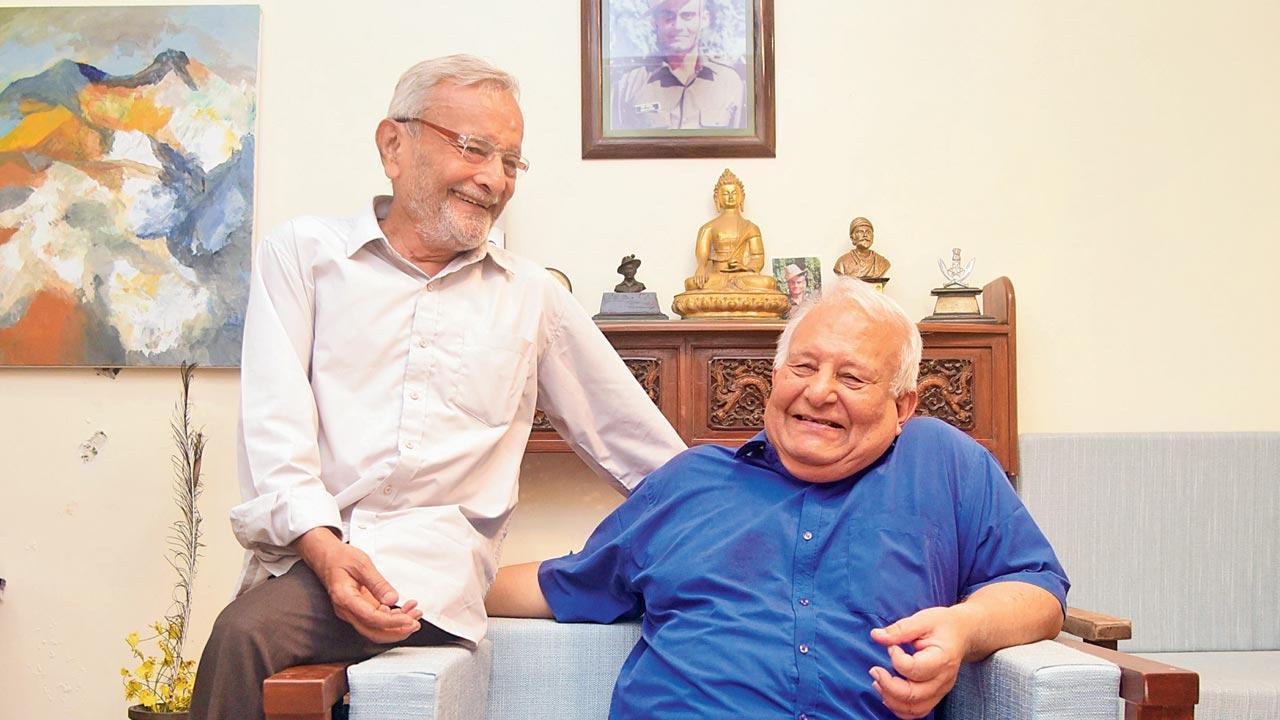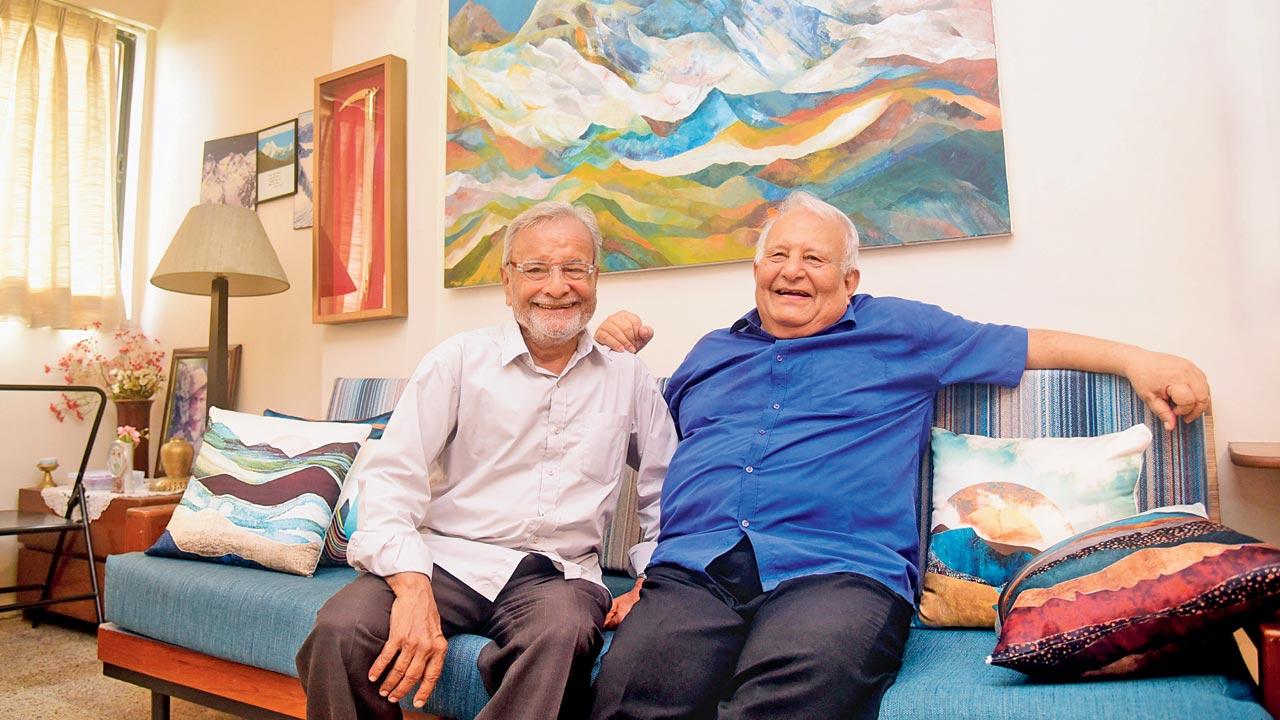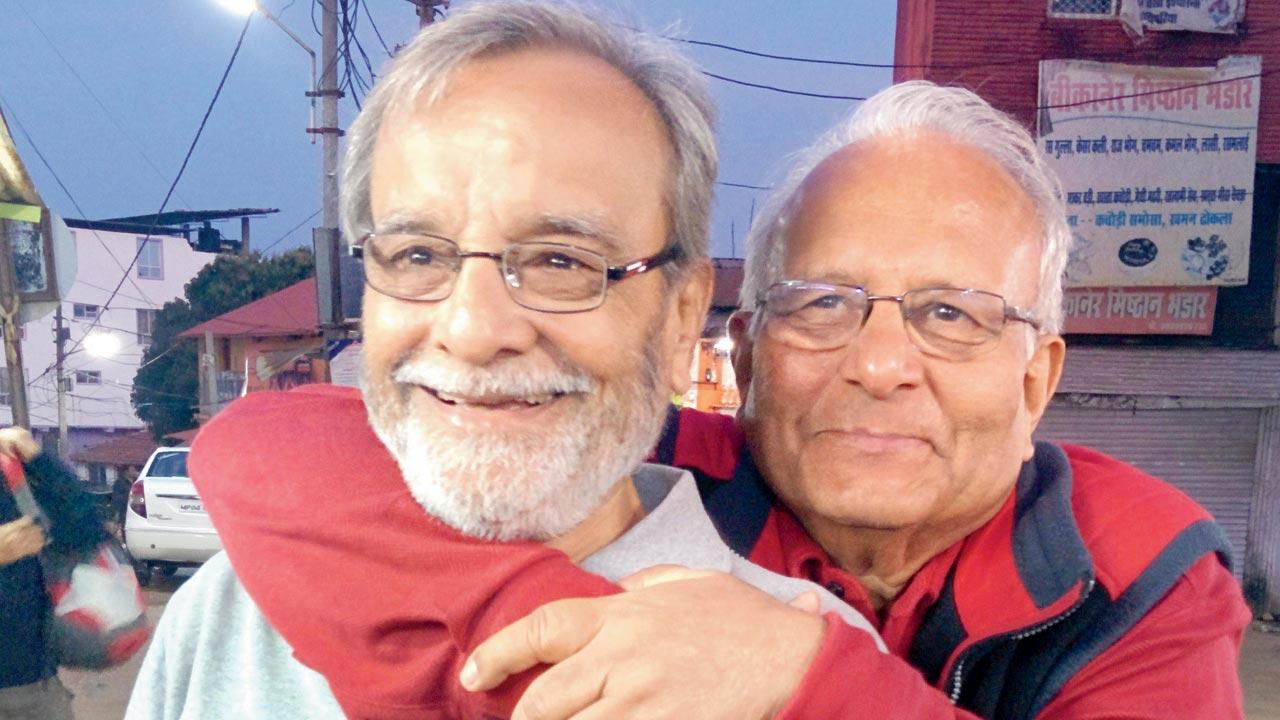Avowed city lovers, Harish Kapadia and Vijay Kothari bond best in the clear air of the Himalaya

Vijay Kothari and Harish Kapadia in the latter’s home; seen in the background are Geeta Kapadia’s paintings of mountain views from Mussoorie and a portrait of their son, the late Lt Nawang Kapadia. Pics/Shadab Khan
 Harish Kapadia, 78, mountaineer and author
Harish Kapadia, 78, mountaineer and author
ADVERTISEMENT
Vijay Kothari, 80, retired textile trader and trekker
The country’s most celebrated mountaineer, Harish Kapadia is an explorer in the finest tradition of great Himalayan pioneers. Chucking up a textile business to conduct over 178 treks and climbs in the Himalaya, backed by outstanding written and photographic documentation, he has campaigned for resolution of the Kashmir conflict through the Siachen Peace Park initiative in the Karakoram region. Naming his sons Sonam and Nawang, after Sherpa friends, he tragically lost the younger, Lt Nawang Kapadia of the Gorkha Regiment, in Kashmir.
Initiating joint expeditions with the UK, US, France and Japan, besides being an honorary member of Alpine Clubs worldwide, he is the recipient of prestigious adventure awards. Lecturing extensively, he is Editor Emeritus of The Himalayan Club Journal, as well as the author of several multi-edition books,
including High Himalaya Unknown Valleys, Siachen Glacier: The Battle of Roses, and Autumn Passage to the Himalaya: Treks, Travels and History.

Reflecting his friend’s mentoring influence, the trekking instinct has taken Vijay Kothari scaling peaks and glaciers galore. Starting with the Sahyadri range in the Western Ghats, from 1968, he has first ascents to his credits (a first ascent is the first successful reaching of a mountain top or the first following of a particular climbing route).
The friends swap views on fresh air, family ties and food—over delectable Gujarati lunch in Harish bhai’s home.
Harish Kapadia: It’s strange how life chooses one’s path ahead. My father had a Raymond’s stockist shop in Laxmidas Market at Vithalwadi, Kalbadevi. Not inclined to study for an MBA, I sat at that counter for years, preferring to watch cricket whenever possible. My son Sonam became a banker. Nawang dismissed the shop as “an air-conditoned jail”. The turning point lay in realising that neither was continuing at the shop. I gave up the enterprise happily for the call of the mountains instead.
 The friends on a Pachmarhi trek in 2017. Pic Courtesy/Harish Kapadia
The friends on a Pachmarhi trek in 2017. Pic Courtesy/Harish Kapadia
Vijay Kothari: After my Inter exam in Ruia College in 1962, I joined the velvet yarn-to-cloth trade my father and uncles ran from a Ghatkopar factory. Among the items we sold to wholesale merchants were the black prayer caps that Parsis wear—now outdated because they are replaced by manmade velvet, rayon and other materials.
I remember the June 1969 day we were both out with The Climbers Club. We got chatting a year later, finding ourselves in the same bogey of a Kalyan local and changing trains at Karjat for an overnight trek to Chanderi.
HK: I soon realised he is the man who will feed everyone! His naasta-paani bandobast, especially homemade batata nu rasa valoo shaak was what we craved and looked forward to on nights at Dudha Lake near Mumbra. The lake doesn’t exist today. It would provide water for GIP Railway steam engines that fascinatingly chugged past us. That rural charm has disappeared. Hiking societies were a hundred times more active too.
VK: How the Mumbai landscape has changed. There were plenty of green hills around Ghatkopar in my childhood. We’d cycle from here to Vihar Lake and Juhu. Coming from a simple chawl, I’ve enjoyed wonderful outings in the mountains with Harish bhai and his wife Geeta ben. We have done some major climbs, including the 1992 Indian-British Panch Chuli Expedition he led with Sir Chris Bonington.
Besides this main interest, he introduced me to music concerts, movies, plays which I had nil exposure to earlier. The fruit of our friendship is 100 per cent
understanding and respect for each other, despite being so different— ghani joodi personality amaari.
HK: Ah, but he gives me such fantastic elder brother advice. I take it because of mutual trust and confidence. Calling him Vijay feels odd. Being the most balanced person, his nickname is Paka. For his composure and organised temperament, he’s considered “paka kaam no”—seldom losing his cool or doing things in haste.
An exception, of course, was a life-threatening situation. Paka was caught in a critical mishap on Panch Chuli, when he lagged behind the rest one whole day. He missed his footing by a step against a soft snow wall and rolled like a drum for 300 metres. Calm on most occasions, he had mistakenly hurried to catch up with the group.
VK: And Harish bhai’s 1974 accident was terrible. While returning from the amazing first ascent of Devtoli peak in Nanda Devi Sanctuary, he fell into a crevasse and dislocated his left hip. Carried by rescue porters over 13 painful days to base camp, he was flown back in an IAF helicopter. Six weeks in plaster, two years walking on crutches, one month with a stick, and he was off again trekking in Sikkim.
HK: Pakaji’s hand-churned ice cream kept me going, plus superb jalebi-gathia and mavo from his home. My saviour drove many weekends picking me up and dropping me from treks,
Ghatkopar to Pedder Road, near my house, and back.
With the toughest challenges, there’s nothing like the invigorating beauty of the mountains. It is unbeatable, this junoon, the madness to try new peaks.
VK: Really, what else can beat the cool of the hills and my churned ice cream. No party is complete without it. Just as Geeta knows there’s no better meal for me than her dal-bhaat.
HK: It’s only honest to mention the bad language Paka and I exchange. Our salutations are sprinkled with swear words. We’ve travelled to Pachmarhi every December-January, since 1971, for rock climbing and rope practice. The mountains pull very different people passionately together. When not up on slopes, we’re pure Mumbai people. I even write best in this noisy, crazy city.
VK: Invested in something, you love it. Mumbai is that shared emotion. Geeta has accompanied us on all treks; her paintings of the mountains from Mussoorie are beautiful. She is extremely important to our friendship. I am single. Harish is close to my nephews, the way I’ve been with his boys. We are family first—and also friends.
Author-publisher Meher Marfatia writes monthly on city friendships. You can reach her at meher.marfatia@mid-day.com/www.meher marfatia.com
 Subscribe today by clicking the link and stay updated with the latest news!" Click here!
Subscribe today by clicking the link and stay updated with the latest news!" Click here!







